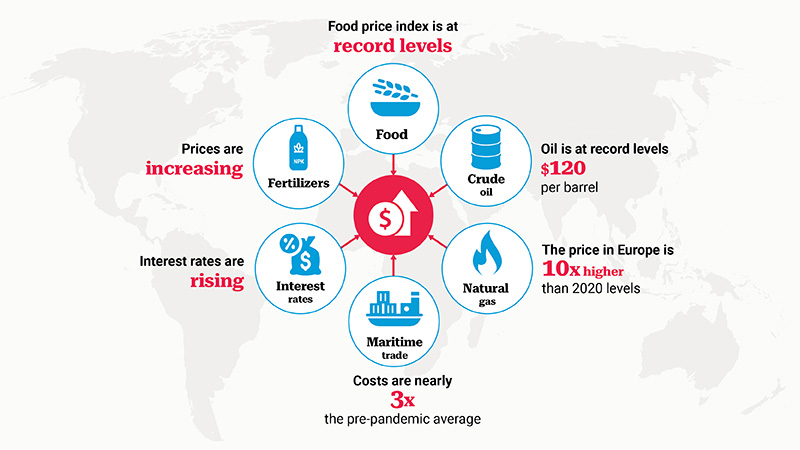UN Global Crisis Response Group urges stability in global food and energy markets to break the vicious cycle of rising prices across the world.

© UNDP Nigeria | A farmer tends his crops in a field in Nigeria.
More than three months since the start of the war in Ukraine, people globally are facing a cost-of-living crisis not seen in more than a generation, with escalating price shocks in the global food, energy and fertilizer markets – in a world already grappling with the COVID-19 pandemic and climate change.
An estimated 1.6 billion people in 94 countries are exposed to at least one dimension of the crisis, and about 1.2 billion of them live in "perfect-storm" countries which are severely vulnerable to all three dimensions – food, energy and finance – of the cost-of-living crisis, according to the latest findings of the United Nations Secretary-General’s Global Crisis Response Group (GCRG) on food, energy and finance systems.
“For those on the ground, every day brings new bloodshed and suffering. And for people around the world, the war, together with the other crises, is threatening to unleash an unprecedented wave of hunger and destitution, leaving social and economic chaos in its wake,” warned Secretary-General Anto´nio Guterres at the launch of the GCRG’s latest brief.
“Vulnerable people and vulnerable countries are already being hit hard but, make no mistake, no country or community will be left untouched by this cost-of-living crisis.”
A vicious cycle
Countries’ ability to deal with adversity in the face of rising global challenges continues to erode. To address the crisis, strong political will across the multilateral community and a comprehensive approach is foremost necessary. The vicious cycles the crisis creates shows that no one dimension of the crisis can be fixed in isolation.
“Tackling just one aspect will not solve the global crisis we are in,” adds Rebeca Grynspan, the Secretary-General of the UN Conference on Trade and Development, joining Guterres at the launch of the brief. Read Ms. Grynspan's full statement.
“Incomes are being squeezed, and families are forced to decide how to allocate shrinking household finances. And so with this mind, another vicious cycle starts - the cycle of social unrest leading to political instability as a result of the weakened ability of countries and families to cope with yet another global crisis, on top of COVID-19 and the climate crisis.”

A crisis of access
Today, about 60 percent of the world’s workforce is estimated to have lower incomes than before the pandemic. More than half of the world’s poorest countries are in debt distress or at high risk of it.
According to the brief, the increase in hunger since the start of the war could be higher and more widespread. World Food Programme estimates show that the number of severely food insecure people doubled from 135 million pre-pandemic to 276 million over just two years. The ripple effects of the war in Ukraine, however, are expected to drive this number up to 323 million in 2022.
The Food and Agriculture Organization’s latest food price index had already reached a record high in February 2022 before the war started, since then it has had some of the largest one-month increases in its history, with its record high in March 2022.
“This year’s food crisis is about lack of access. Next year’s could be about lack of food,” said the UN Secretary-General. “We need to bring stability to global food and energy markets to break the vicious cycle of rising prices and bring relief to developing countries. Ukraine’s food production, and the food and fertilizer produced by Russia, must be brought back into world markets – despite the war.”
Guterres announced that he has asked Grynspan and UN humanitarian chief Martin Griffiths to coordinate two task-forces to allow for a “safe and secure export of Ukrainian-produced food through the Black Sea” as well as to ensure “unimpeded access to global markets for Russian food and fertilizers.”
Regional implications
Despite the widespread impact of the crisis, not all regions and subregions are exposed in the same way, says the report, stressing the fact that some countries and communities are more vulnerable than others and need assistance urgently.
Countries in Sub-Saharan Africa, for example, remain significantly vulnerable with one out of every two Africans in the region exposed to all three dimensions of the crisis. The Latin America and the Caribbean region is the second largest group facing the cost-of-living crisis with nearly 20 countries deeply affected.
Extreme poverty could threaten the lives and livelihoods of 2.8 million people in the Middle East and North Africa. In South Asia, which is currently experiencing crippling levels of heatwaves, 500 million people are severely exposed to the food and finance crisis. Countries in Eastern Europe and Central Asia are severely exposed to the energy and finance dimensions, given the importance of remittances and energy exports from Russia.
The brief makes policy recommendations to address the cost-of-living crisis, highlighting immediate action on two critical fronts - the urgent need for stability in the global food and energy markets to break the vicious cycle of rising prices and the imperative to bring relief to developing countries, calling on resources to be made available immediately to help the poorest countries and communities.
“There is no solution to this global crisis without a solution to the economic crisis in the developing world. The global financial system must rise above its shortcomings and use all the instruments at its disposal, with flexibility and understanding, to provide support to vulnerable countries and vulnerable people,” stressed Guterres.
“The message of today’s report is clear and insistent: we must act now to save lives and livelihoods over the next months and years. It will take global action to fix this global crisis.”


